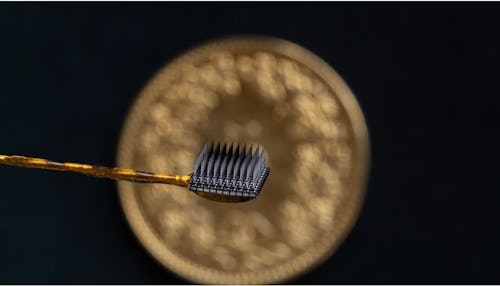This brain implant allowed a fully paralyzed man to communicate
For the first time, scientists helped a "locked-in" man spell words with his mind.

Despite the very real limits of science, technological advances are making things we never imagined possible — especially when it comes to improving the lives of disabled people. A team of scientists announced this morning that they have designed a brain implant that has allowed a fully paralyzed man to communicate using only his mind.
The case study, which was published Tuesday in Nature Communications, details the painstaking process that scientists used to achieve what could be something like a medical miracle. The man, whose name has not been released in order to protect his privacy, has Amyotrophic lateral sclerosis, also known as ALS or Lou Gehrig’s disease. In case you don’t know, ALS is a progressive disease of the nervous system that affects a patient’s ability to control the muscles of the body. Most ALS patients gradually lose the muscular control needed to perform basic body functions, like speaking and eating, and there is no known cure.
The case study is really complex, but stay with me because it totally pays off. The man who was the subject of the study was in a fully “locked-in” state, meaning that he was fully conscious but had no ability to move any muscles. Before his total paralysis, the man had been using eye movements to communicate. Before he became locked in, scientists implanted electrodes in his brain in the areas that control movement and tried to match auditory signals meaning “yes,” and “no,” to his brain activity.
They were ultimately successful and eventually were able to build a more sophisticated communication system with the man that allowed him to communicate letters and eventually full sentences. During the study, conducted at the Wyss Center for Bio and Neuroengineering in Geneva, in the 107 days he spent spelling out sentences with the researchers, the man was able to communicate 44 intelligible sentences. Some of the sentences were requests for care and some described his food cravings. At one point, the man made a specific request for potato curry, which I particularly relate to.
By the end of the study, the man was able to communicate at the rate of about one character per minute, the New York Times reported. That may seem like a long time in our age of connectivity, but for people who are unable to communicate at all, it is nothing short of revolutionary. Imagine the emotional challenge of being literally unable to communicate your fundamental needs and desires. Most of us can’t get through an hour without telling everyone on social media what we want and need. “It’s a game-changer,” Steven Laureys, a neurologist and researcher at the University of Liège in Belgium who was not involved in the study, told the Times.
To be clear, this is a single case, so there’s no way to predict whether the result will be replicable. And the research — and the researcher’s methods — have been questioned by scientists involved in the study who claim that their methods were not rigorous enough, the Times reported. These claims are currently being investigated by the German Research Foundation.
Look, this science may not yield the sci-fi worthy telekinetic magic that some of us — okay, me — are hoping for. But if this study holds up to scrutiny, it could change the lives of a lot of people who are unable to communicate due to ALS or traumatic brain injury.